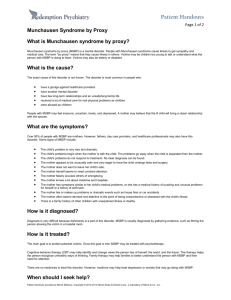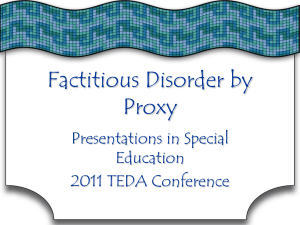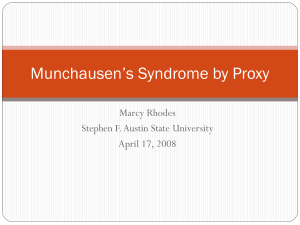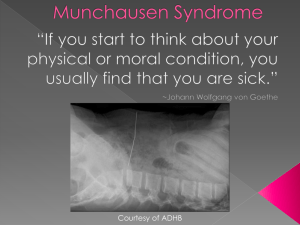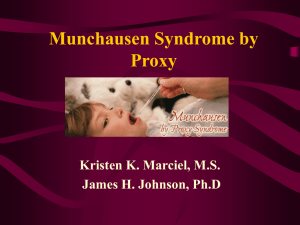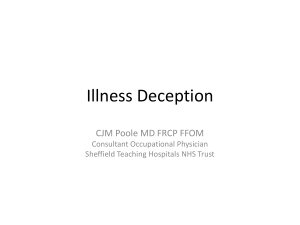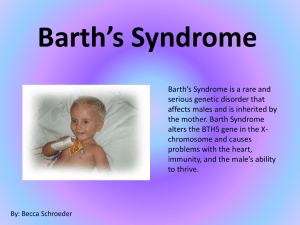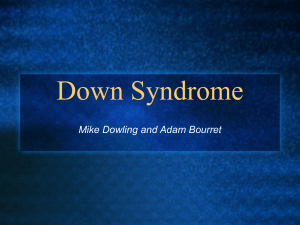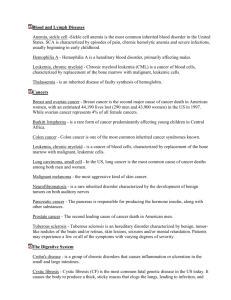PEDIATRIC CONDITION FALSIFICATION (PCF)
advertisement
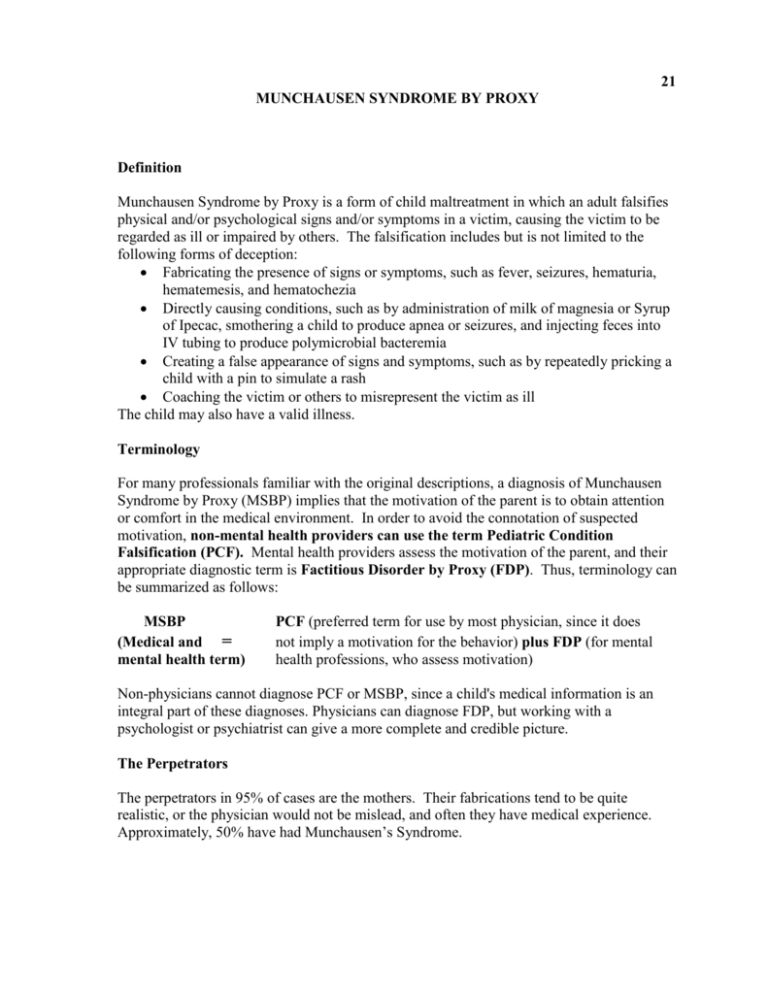
21 MUNCHAUSEN SYNDROME BY PROXY Definition Munchausen Syndrome by Proxy is a form of child maltreatment in which an adult falsifies physical and/or psychological signs and/or symptoms in a victim, causing the victim to be regarded as ill or impaired by others. The falsification includes but is not limited to the following forms of deception: Fabricating the presence of signs or symptoms, such as fever, seizures, hematuria, hematemesis, and hematochezia Directly causing conditions, such as by administration of milk of magnesia or Syrup of Ipecac, smothering a child to produce apnea or seizures, and injecting feces into IV tubing to produce polymicrobial bacteremia Creating a false appearance of signs and symptoms, such as by repeatedly pricking a child with a pin to simulate a rash Coaching the victim or others to misrepresent the victim as ill The child may also have a valid illness. Terminology For many professionals familiar with the original descriptions, a diagnosis of Munchausen Syndrome by Proxy (MSBP) implies that the motivation of the parent is to obtain attention or comfort in the medical environment. In order to avoid the connotation of suspected motivation, non-mental health providers can use the term Pediatric Condition Falsification (PCF). Mental health providers assess the motivation of the parent, and their appropriate diagnostic term is Factitious Disorder by Proxy (FDP). Thus, terminology can be summarized as follows: MSBP (Medical and = mental health term) PCF (preferred term for use by most physician, since it does not imply a motivation for the behavior) plus FDP (for mental health professions, who assess motivation) Non-physicians cannot diagnose PCF or MSBP, since a child's medical information is an integral part of these diagnoses. Physicians can diagnose FDP, but working with a psychologist or psychiatrist can give a more complete and credible picture. The Perpetrators The perpetrators in 95% of cases are the mothers. Their fabrications tend to be quite realistic, or the physician would not be mislead, and often they have medical experience. Approximately, 50% have had Munchausen’s Syndrome. 22 The motivation of the parent may be to: Obtain attention or comfort as the devoted parent of a "sick" child Manipulate a system by child maltreatment false reports Keep a child dependent, such as by not attending school Seek help (parent overwhelmed) Relieve unwarranted health concerns, as in the vulnerable child syndrome Wish to covertly manipulate authority figures Those mothers who seek admission to the hospital for its nurturing milieu tend to remain at the child’s bedside, forming close relationships with the physicians and nurses. Other Family Members Older siblings of the victim commonly have a history suggesting they were victims of the disorder, until the mother transferred the falsification to the younger child. Sometimes, older siblings died under suspicious circumstances. The fathers are generally in the home but not closely involved with the children. They do not appear to know of the fabrication and have difficulty believing it. Why this Disorder is Physical Abuse As a result of the parent’s fabrications or actions, a physician orders painful and sometimes risk-associated tests and procedures, as well as repeated hospitalizations. Some of the children die as a result of the parent’s actions. Formulating a Suspicion of the Disorder Objective medical evidence includes the following: Finding an unexpected drug in child’s blood, urine, or stool Finding the mother’s blood in child’s vomitus, urine, or stool Observation of parent in the act of inducing illness Findings consistent only with an induced illness Non-objective medical evidence includes the following: Persistent or recurrent illnesses for which a cause cannot be found Discrepancies between the history and medical findings Symptoms and signs that do not occur when a child is away from the mother Symptoms, signs, or hospital course that do not make sense A differential diagnosis consisting of disorders less common than Munchausen Syndrome by Proxy Persistent failure of a child to tolerate or respond to medical therapy without clear cause A parent less concerned than the physician, often comforting the medical staff Repeated hospitalizations and vigorous medical evaluations of a child without definitive diagnosis 23 A parent who is constantly at the child’s bedside, excessively praises the staff, becomes overly attached to the staff, or highly involved in the care of other patients A parent who welcomes medical tests of her child, even when painful The diagnosis can be so difficult to establish that many hospitals have instituted patient covert video assessment to protect the child and document a parent’s actions. Management A reasonable suspicion of the disorder should be reported to the Child Maltreatment Hotline. Conclusion Munchausen Syndrome by Proxy/Pediatric Condition Falsification is a complex pediatric disorder requiring a collaboration of physicians, nurses and social workers in its identification and management. Although difficult to recognize, recognition and management is essential to minimize painful tests and procedures and maintain safety of the child.

